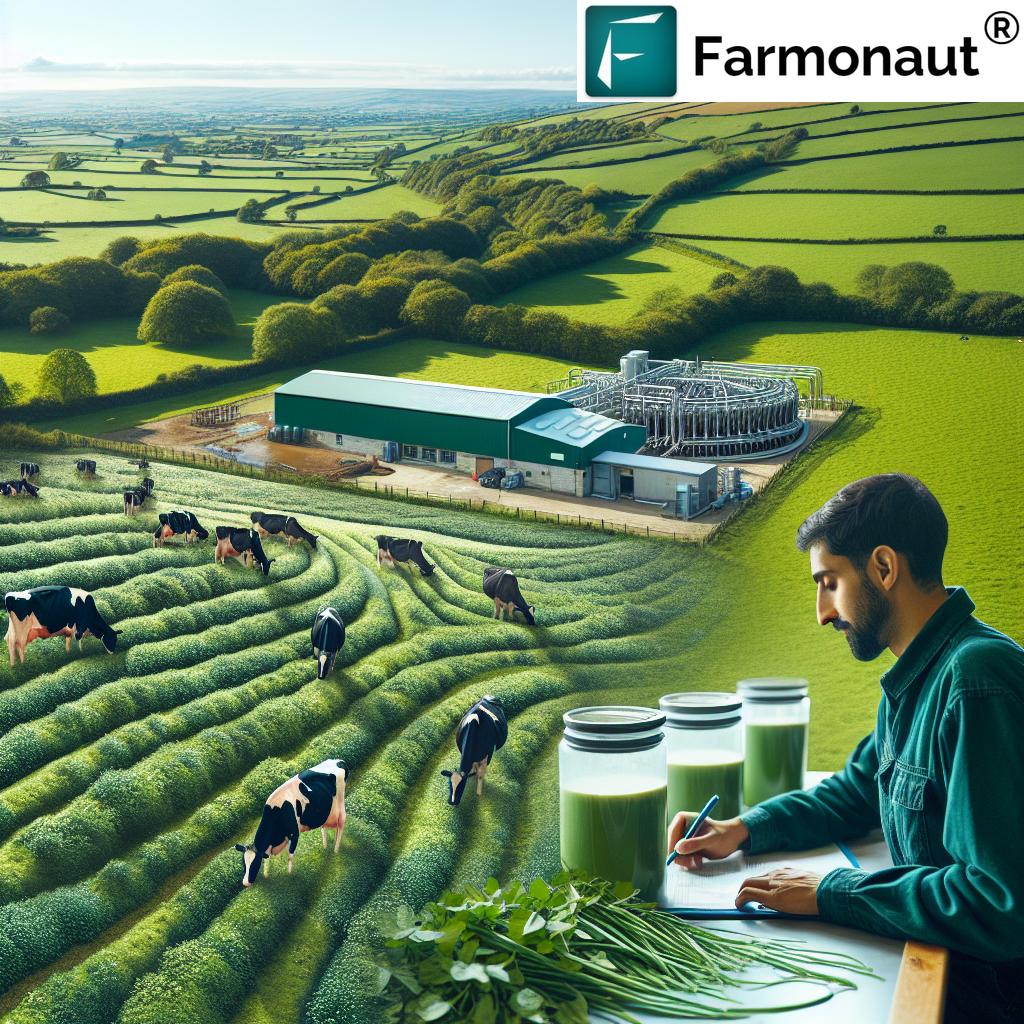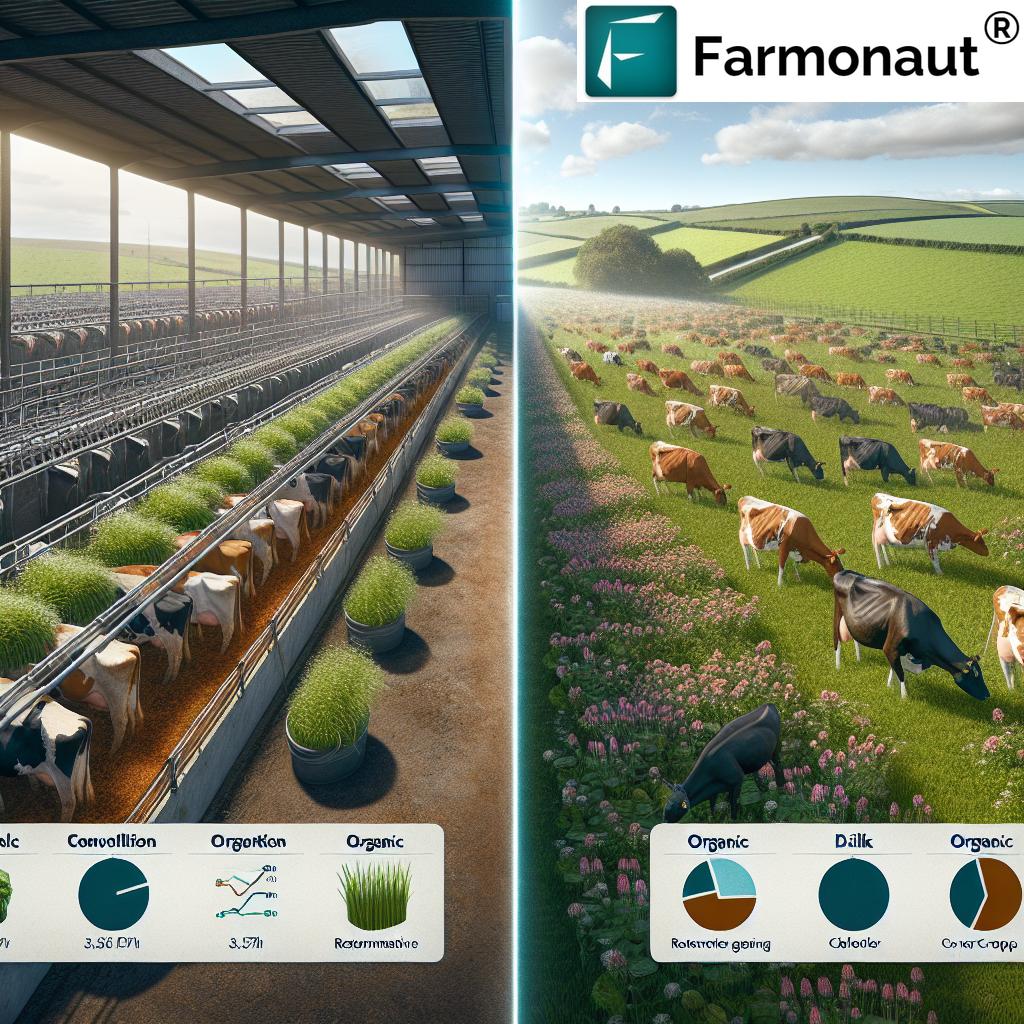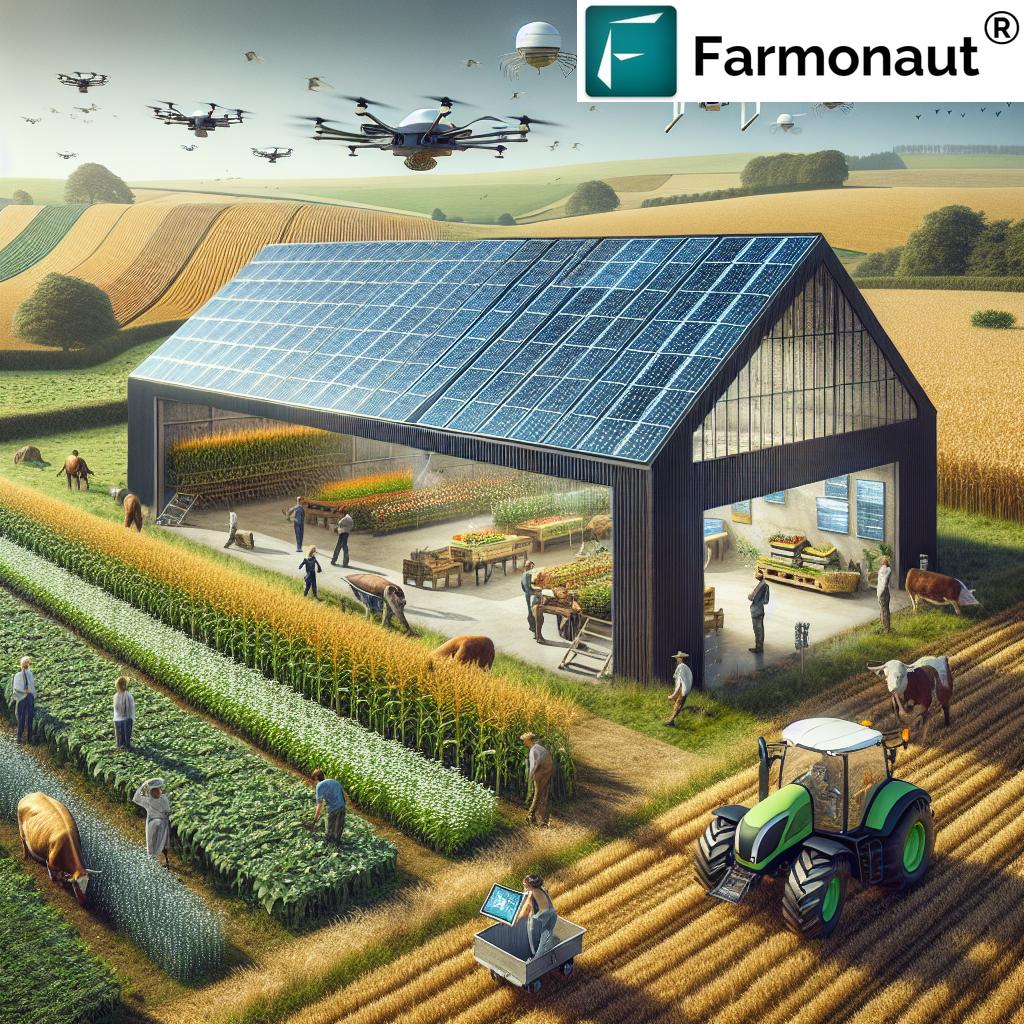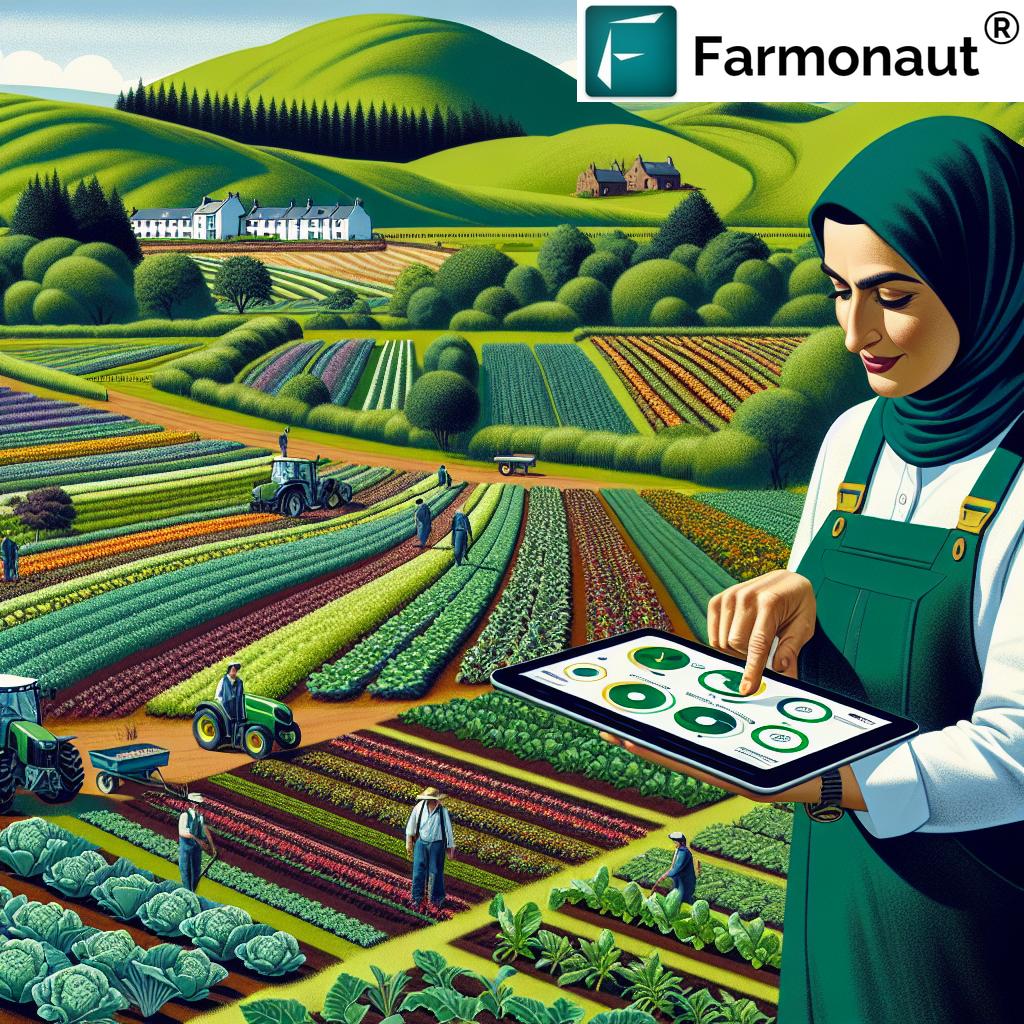Revolutionizing UK Organic Dairy Farming: Sustainable Practices for Enhanced Productivity and Soil Health
“UK organic dairy farms achieve impressive six-week calving blocks, enhancing productivity and management efficiency.”
Welcome to our comprehensive exploration of the revolutionary changes sweeping through UK organic dairy farming. In this blog post, we’ll delve into the sustainable agriculture practices that are transforming the landscape of milk production in Great Britain. From innovative strategies for boosting dairy cow productivity to cutting-edge approaches in forage-based milk production, we’ll uncover how the UK’s dairy industry is achieving a remarkable balance between productivity, sustainability, and profitability.
As we navigate through this insightful journey, we’ll examine how strategic dairy farm networks are implementing regenerative farming techniques, explore efficient calving management methods, and discuss the integration of herbal leys in pastures for improved soil health. Whether you’re a farmer looking to enhance your farm’s performance or an enthusiast interested in sustainable food production, this blog offers essential insights into the evolving world of organic dairy farming.
The Rise of Organic Dairy Farming in the UK
Organic dairy farming has seen a significant surge in popularity across the UK in recent years. This shift is driven by a growing consumer demand for organic products, increased awareness of environmental issues, and a desire for more sustainable food production methods. Let’s examine some key factors contributing to this rise:
- Consumer Preferences: UK consumers are increasingly seeking out organic dairy products, perceiving them as healthier and more environmentally friendly.
- Environmental Concerns: Organic farming practices are seen as more sustainable, with lower carbon footprints and better soil management.
- Animal Welfare: Organic standards often require higher animal welfare practices, which resonates with ethically-conscious consumers.
- Government Support: Various UK government initiatives and funding schemes have encouraged the transition to organic farming methods.
As we delve deeper into the world of organic dairy farming, it’s crucial to understand how technology is playing a pivotal role in this transformation. Farmonaut, a leading agricultural technology company, offers advanced satellite-based farm management solutions that are particularly beneficial for organic dairy farmers. Through its android, iOS, and web applications, Farmonaut provides real-time crop health monitoring and AI-based advisory systems, which can significantly enhance pasture management and overall farm productivity.

Sustainable Agriculture Practices in Organic Dairy Farming
Sustainable agriculture practices are at the heart of organic dairy farming in the UK. These practices not only enhance productivity but also ensure the long-term health of the land and animals. Here are some key sustainable practices being adopted:
- Rotational Grazing: This practice involves dividing pastures into smaller paddocks and moving cows frequently. It helps in maintaining grass quality, improving soil health, and reducing parasite loads.
- Diverse Pasture Composition: Planting a mix of grasses, legumes, and herbs in pastures improves nutrition for cows and enhances soil biodiversity.
- Reduced Chemical Inputs: Organic farmers rely on natural methods for pest and disease control, minimizing the use of synthetic chemicals.
- Efficient Manure Management: Proper handling and application of manure help in nutrient recycling and reduce environmental impact.
- Water Conservation: Implementing efficient irrigation systems and rainwater harvesting techniques to optimize water use.
These practices not only align with organic principles but also contribute to the overall sustainability of the farm. By leveraging Farmonaut’s satellite-based crop health monitoring, farmers can make more informed decisions about pasture management and resource allocation, further enhancing the effectiveness of these sustainable practices.
Strategic Dairy Farm Networks: A Collaborative Approach
One of the most innovative developments in UK organic dairy farming is the establishment of strategic dairy farm networks. These networks serve as a platform for knowledge sharing, collaborative research, and the implementation of best practices. Here’s how they’re making a difference:
- Peer-to-Peer Learning: Farmers share experiences and insights, accelerating the adoption of successful practices.
- Research Partnerships: Collaboration with universities and research institutions to develop and test new farming techniques.
- Demonstration Farms: Selected farms showcase innovative practices, serving as real-world examples for others to learn from.
- Data Sharing: Pooling of farm data helps in benchmarking performance and identifying areas for improvement.
These networks are instrumental in achieving what we call the “triple win” in organic dairy farming: enhanced productivity, improved sustainability, and increased profitability. By fostering collaboration and knowledge exchange, these networks are driving the industry forward.
Regenerative Farming Techniques in Organic Dairy
Regenerative farming is gaining traction in the UK’s organic dairy sector, offering a holistic approach to farm management that goes beyond sustainability to actively improve the ecosystem. Key regenerative techniques include:
- No-Till Farming: Minimizing soil disturbance to preserve soil structure and organic matter.
- Cover Cropping: Planting crops to cover the soil between main crop seasons, reducing erosion and improving soil health.
- Integrated Livestock Management: Using livestock as a tool for land regeneration through planned grazing.
- Agroforestry: Incorporating trees and shrubs into pastures to enhance biodiversity and provide additional benefits to livestock.
These techniques not only improve soil health and biodiversity but also contribute to carbon sequestration, making organic dairy farms part of the solution to climate change. Farmonaut’s technology can play a crucial role here, offering tools for carbon footprint tracking and resource management that align perfectly with regenerative farming principles.
Learn more about Farmonaut’s API for advanced agricultural insights
Enhancing Dairy Cow Productivity
Improving dairy cow productivity is a key focus for organic farmers in the UK. This is achieved through a combination of breeding, nutrition, and management practices:
- Breeding Programs: Selecting for traits like grass-based milk production efficiency and disease resistance.
- Optimized Nutrition: Balancing pasture-based diets with appropriate supplementation to meet nutritional needs.
- Health Management: Implementing preventive health measures and natural treatments to maintain herd health.
- Comfortable Housing: Providing stress-free environments that promote natural behaviors and rest.
By focusing on these areas, UK organic dairy farmers are seeing improvements in milk yields, cow longevity, and overall herd health. The use of Farmonaut’s AI-driven Jeevn advisory system can further enhance these efforts by providing personalized insights and recommendations for optimal herd management.
“Strategic dairy farm networks in the UK are implementing regenerative farming techniques for a triple win in productivity, sustainability, and profitability.”
Forage-Based Milk Production: The Future of Organic Dairy
Forage-based milk production is at the core of organic dairy farming in the UK. This approach focuses on maximizing the use of pasture and home-grown forages to produce milk, reducing reliance on imported feeds. Key aspects include:
- Pasture Management: Implementing rotational grazing systems to optimize grass growth and quality.
- Forage Conservation: Producing high-quality silage and hay for winter feeding.
- Diverse Forage Crops: Growing a variety of forage crops to extend the grazing season and improve nutrition.
- Precision Grazing: Using technologies like grass measuring tools and satellite imagery to make informed grazing decisions.
Forage-based systems not only align with organic principles but also often result in milk with higher nutritional value. Farmonaut’s satellite-based crop health monitoring can be particularly valuable in this context, helping farmers track pasture conditions and make data-driven decisions about grazing management.
Efficient Calving Management in Organic Dairy Farms
Efficient calving management is crucial for the success of organic dairy farms in the UK. Many farms are now implementing impressive six-week calving blocks, which offer several advantages:
- Synchronized Production: Aligning calving with peak grass growth for optimal nutrition.
- Labor Efficiency: Concentrating calving-related tasks into a shorter period.
- Improved Calf Management: Allowing for more focused attention on newborn calves.
- Better Herd Health: Reducing the spread of diseases by having a more uniform age group.
Achieving successful six-week calving blocks requires careful planning, precise heat detection, and effective fertility management. Farmonaut’s technology can assist in this area by providing tools for tracking and managing herd data, ensuring that farmers can make informed decisions about breeding and calving schedules.
Explore Farmonaut’s API Developer Documentation for advanced agricultural insights
Integrating Herbal Leys for Improved Soil Health
The integration of herbal leys into pastures is an innovative practice gaining popularity among UK organic dairy farmers. Herbal leys are diverse mixtures of grasses, legumes, and herbs that offer multiple benefits:
- Enhanced Soil Structure: Deep-rooting herbs improve soil structure and drainage.
- Increased Biodiversity: Diverse plant species support a wider range of insects and wildlife.
- Improved Nutrition: Herbs can provide essential minerals and medicinal properties for livestock.
- Drought Resistance: Many herbs are more tolerant to dry conditions than traditional grass species.
By incorporating herbal leys, farmers are seeing improvements in soil health, animal welfare, and milk quality. Farmonaut’s satellite imagery and AI-driven insights can help farmers monitor the performance of these diverse pastures, ensuring optimal management and utilization.

Optimizing Herd Management in Organic Dairy Farms
Effective herd management is crucial for the success of organic dairy farms. UK farmers are adopting various strategies to optimize their herds:
- Genetic Selection: Choosing breeds and individuals suited for organic, grass-based systems.
- Health Planning: Implementing comprehensive health plans focusing on prevention rather than treatment.
- Behavior Monitoring: Using technology to track cow behavior for early detection of health issues.
- Targeted Nutrition: Tailoring feed strategies to different life stages and production levels.
These approaches not only improve animal welfare but also contribute to increased productivity and milk quality. Farmonaut’s AI-powered advisory system can provide valuable insights for herd management, helping farmers make data-driven decisions about breeding, nutrition, and health care.
Minimizing Environmental Impact in Organic Dairy Farming
UK organic dairy farms are at the forefront of efforts to minimize environmental impact. Key strategies include:
- Carbon Sequestration: Implementing practices that increase soil organic matter and capture carbon.
- Renewable Energy: Adopting solar, wind, or biogas technologies to reduce reliance on fossil fuels.
- Water Management: Implementing rainwater harvesting and efficient irrigation systems.
- Biodiversity Enhancement: Creating wildlife corridors and maintaining hedgerows to support local ecosystems.
These efforts not only reduce the environmental footprint of dairy farming but also contribute to the overall health of the surrounding ecosystem. Farmonaut’s carbon footprinting tools can be invaluable in this context, helping farmers track and reduce their emissions over time.
The Role of Technology in Modern Organic Dairy Farming
Technology is playing an increasingly important role in UK organic dairy farming, helping to balance traditional practices with modern efficiency:
- Precision Agriculture: Using GPS and satellite imagery for precise pasture management.
- Data Analytics: Employing big data to analyze farm performance and make informed decisions.
- Automation: Implementing robotic milking systems that allow for more natural cow behavior.
- IoT Sensors: Using connected devices to monitor animal health, milk quality, and environmental conditions.
Farmonaut’s suite of technologies, including satellite-based crop health monitoring and AI-driven advisory systems, are at the forefront of this technological revolution in organic dairy farming. These tools enable farmers to make more precise, data-driven decisions, leading to improved efficiency and sustainability.
Agricultural Knowledge Sharing Initiatives
Knowledge sharing is crucial for the advancement of organic dairy farming in the UK. Several initiatives are facilitating this exchange of information:
- Farmer Discussion Groups: Regular meetings where farmers share experiences and best practices.
- Online Forums and Webinars: Digital platforms for sharing knowledge across geographical boundaries.
- Demonstration Farms: Showcasing successful practices through farm visits and open days.
- Collaborative Research Projects: Partnerships between farmers, universities, and research institutions.
These initiatives are crucial for disseminating new ideas and techniques, helping the organic dairy sector evolve and improve continuously. Farmonaut contributes to this knowledge-sharing ecosystem by providing data-driven insights and analysis that can be shared and discussed within these forums.
Comparative Analysis of Organic Dairy Farming Practices
| Farming Aspect | Traditional Practice | Innovative Sustainable Practice | Benefits |
|---|---|---|---|
| Pasture Management | Continuous grazing | Rotational grazing with diverse herbal leys | Improved soil health, 20-30% increase in grass yield |
| Calving | Year-round calving | Six-week calving blocks | 15-20% increase in labor efficiency, better herd health |
| Herd Management | Manual observation | AI-driven health monitoring systems | Early disease detection, 10-15% reduction in treatment costs |
| Soil Health | Chemical fertilizers | Cover crops and organic amendments | 50% increase in soil organic matter, improved water retention |
The Future of UK Organic Dairy Farming
As we look to the future, several trends are likely to shape the UK organic dairy farming landscape:
- Increased Automation: Further adoption of robotic milking and automated feeding systems.
- Climate-Resilient Practices: Development of farming methods adaptable to changing climate conditions.
- Circular Economy Approaches: Integrating dairy farming with other agricultural sectors for resource efficiency.
- Consumer Transparency: Increased use of blockchain and traceability systems to provide farm-to-table information.
These developments promise to make UK organic dairy farming more sustainable, efficient, and consumer-friendly. Farmonaut’s continuous innovation in agricultural technology, including its blockchain-based traceability solutions, positions it as a key player in shaping this future.
Conclusion
The revolution in UK organic dairy farming is well underway, driven by a combination of innovative sustainable practices, strategic collaboration, and technological advancements. From the implementation of regenerative farming techniques to the adoption of efficient calving management and the integration of herbal leys, organic dairy farmers are finding new ways to enhance productivity while prioritizing soil health and environmental sustainability.
The role of technology, exemplified by platforms like Farmonaut, cannot be overstated. By providing real-time data on crop health, weather patterns, and carbon footprints, these tools are empowering farmers to make more informed decisions and optimize their operations.
As we move forward, the future of UK organic dairy farming looks bright. With continued focus on knowledge sharing, sustainable practices, and technological integration, the industry is well-positioned to meet the growing demand for organic dairy products while contributing positively to environmental conservation and rural economies.
For those looking to stay at the forefront of these developments, consider exploring Farmonaut’s suite of agricultural technology solutions. Whether you’re a farmer seeking to optimize your operations or an enthusiast interested in the latest in sustainable agriculture, Farmonaut offers tools and insights to support your journey in the evolving world of organic dairy farming.
Frequently Asked Questions (FAQs)
- What are the main benefits of organic dairy farming?
Organic dairy farming offers benefits such as improved animal welfare, reduced environmental impact, higher quality milk products, and often better profitability for farmers due to premium pricing. - How does rotational grazing improve pasture management?
Rotational grazing allows pastures to recover between grazing periods, leading to improved grass growth, better soil health, and reduced parasite loads in livestock. - What role does technology play in modern organic dairy farming?
Technology, such as Farmonaut’s satellite-based monitoring and AI advisory systems, helps farmers make data-driven decisions, optimize resource use, and improve overall farm efficiency. - How do herbal leys contribute to soil health in dairy farms?
Herbal leys, with their diverse mix of plants, improve soil structure, increase biodiversity, enhance drought resistance, and provide nutritional benefits to livestock. - What is a six-week calving block, and why is it beneficial?
A six-week calving block is a management strategy where all calving occurs within a six-week period. It improves labor efficiency, aligns peak milk production with peak grass growth, and enhances overall herd management.
















